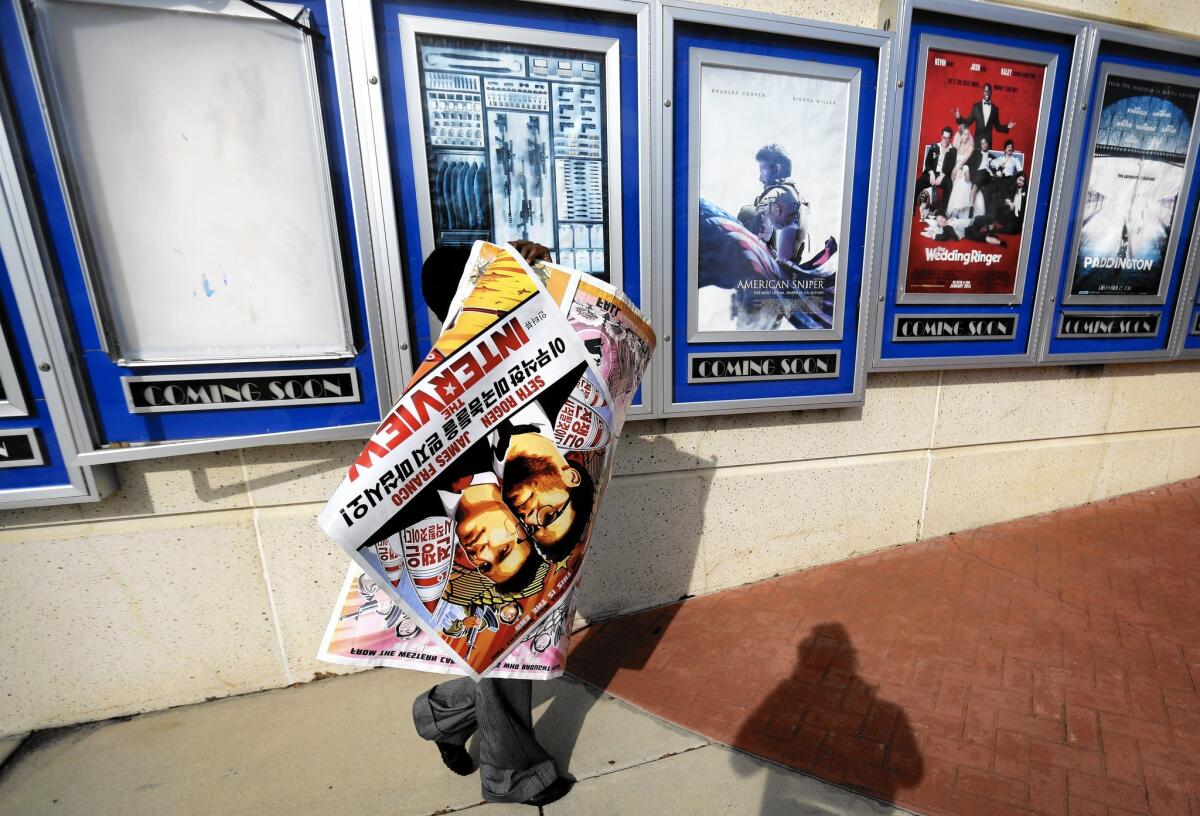Sony scraps ‘The Interview’ release; North Korea blamed for hack

- Share via
Sony Pictures Entertainment’s extraordinary decision to scrap the Christmas release of “The Interview” came amid mounting pressure from powerful theater owners and other studios concerned that the film’s release could keep moviegoers away from multiplexes during the holidays, one of the most lucrative periods for Hollywood.
The action came as U.S. intelligence officials confirmed widespread speculation that the North Korean government was behind the devastating cyberattack, which has hobbled Sony Pictures and spread fear throughout the entertainment industry. “The Interview” depicts the fictional assassination of North Korean leader Kim Jong Un.
Federal investigators began briefing some legislators that the rogue state gave the order to raid Sony’s computer system, leading to a massive leak of sensitive data, including emails, financial documents and even the salaries of Sony’s top executives.
The U.S. government takes “very seriously any attempt to threaten or limit artists’ freedom of speech or of expression,” and it’s “considering a range of options in weighing a potential response” to the cyberattack, a National Security Council spokeswoman said in a Wednesday night statement.
The fast-moving events that led to Sony yanking the film across the country came after the nation’s top theater chains decided to cancel screenings following threats of violence against theater-goers by Guardians of Peace, the hacking group that has claimed responsibility for the attack.
Although law enforcement authorities discounted those threats, theater owners and studio chiefs worried that they would be enough to keep moviegoers away from theaters and hurt the year-end box office for everyone.
The decision would cost Sony perhaps $70 million for the costs of making the film and marketing efforts to date, and could also prompt an executive shake-up, industry analysts said. Sony Pictures Entertainment is led by Chairman Michael Lynton and Co-Chairman Amy Pascal.
“By canceling release of the film, Sony Entertainment is admitting it made the wrong decision to go forward,” said Laura Martin, senior media analyst at Needham & Co. “They are now succumbing to pressure that they obviously underestimated six months ago.”
Sony executives had originally resisted postponing “The Interview,” fearing that doing so would be a victory for the hackers, and set a dangerous precedent for future threats.
Although many in Hollywood expressed relief at Sony’s decision, others expressed anger.
“I think every business has the right to do whatever they want, but when — en masse — all of these businesses decide not to present a movie, they’re basically setting themselves up for other people to threaten them,” said director Judd Apatow, a friend and frequent collaborator of “The Interview’s” director and co-star Seth Rogen. “What do they do when someone says the same thing about the James Bond movie or ‘Annie’?”
At the same time, filmmakers Rogen and Evan Goldberg — with Sony’s consent — made a movie that portrayed the gruesome assassination of a sitting world leader, something that film historians say has not been done before. North Korea called months ago for the film to be sidelined, saying it amounted to an “act of war.”
Exhibitors don’t take the risks lightly. Cinemark is still dealing with legal issues from the “Dark Knight Rises” shooting in the summer of 2012.
Owners of shopping malls also were putting pressure on theaters to bail on the movie, fearing any threat could scare away consumers during the busiest shopping season of the year.
“Due to the wavering support of the film ‘The Interview’ by Sony Pictures, as well as the ambiguous nature of any real or perceived security threats, Regal Entertainment Group has decided to delay the opening of the film in our theatres,” said the company.
AMC, the nation’s second-largest chain, said it canceled because of the “overall confusion and uncertainty that has been created in the marketplace.”
Rival studio executives also shared concerns about the broader impact on attendance for the movies over the holidays. December is a key month for many studios and accounted for roughly $1 billion in ticket sales last year in the U.S. and Canada.
“We’re all afraid people aren’t going to go to theaters in general because of the threat,” said a studio executive who declined to comment publicly because of the sensitivity of the matter. “The theaters are supposed to be an escape for people to get entertained.… If they don’t show up, it could be disastrous.”
“In a year when the box office is down single digits year over year, you didn’t need something else keeping people away from the theaters,” said Eric Wold, an analyst with B. Riley. “It makes complete sense to drop the movie,” said Wold, who noted that loss of the film would likely result in 2% less in quarterly revenue for exhibitors. “It’s a pretty immaterial movie for the potential risk at hand. There’s no upside.”
Sony has decided not to pursue video-on-demand distribution for the film or make it available on YouTube or a streaming service such as Amazon or Neftlix. The option was one of a number of scenarios being explored, according to two people with knowledge of the discussions. A Sony spokesman said simply that the studio “has no further release plans for the film.”
Times staff writers Daniel Miller, Amy Kaufman, Saba Hamedy and Meg James contributed to this report.
More to Read
From the Oscars to the Emmys.
Get the Envelope newsletter for exclusive awards season coverage, behind-the-scenes stories from the Envelope podcast and columnist Glenn Whipp’s must-read analysis.
You may occasionally receive promotional content from the Los Angeles Times.












